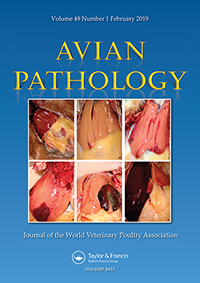Ver ítem
- xmlui.general.dspace_homeCentros e Institutos de InvestigaciónCICVyA. Centro de Investigación en Ciencias Veterinarias y AgronómicasInstituto de PatobiologíaArtículos científicosxmlui.ArtifactBrowser.ItemViewer.trail
- Inicio
- Centros e Institutos de Investigación
- CICVyA. Centro de Investigación en Ciencias Veterinarias y Agronómicas
- Instituto de Patobiología
- Artículos científicos
- Ver ítem
Evaluation of the transcriptional status of host cytokines and viral genes in the trachea of vaccinated and non-vaccinated chickens after challenge with the infectious laryngotracheitis virus
Resumen
Infectious laryngotracheitis is a highly contagious disease of chickens responsible for significant
economic losses for the poultry industry worldwide. The disease is caused by Gallid herpesvirus-1
(GaHV-1) commonly known as the infectious laryngotracheitis virus. Although characterized by
their potential to regain virulence, chicken embryo origin (CEO) vaccines are the most effective
vaccines against laryngotracheitis as they significantly reduce the
[ver mas...]
Infectious laryngotracheitis is a highly contagious disease of chickens responsible for significant
economic losses for the poultry industry worldwide. The disease is caused by Gallid herpesvirus-1
(GaHV-1) commonly known as the infectious laryngotracheitis virus. Although characterized by
their potential to regain virulence, chicken embryo origin (CEO) vaccines are the most effective
vaccines against laryngotracheitis as they significantly reduce the replication of challenge virus
in the trachea and conjunctiva. Knowledge on the nature of protective immunity elicited by CEO
vaccines is very limited. Therefore, elucidating the origin of the immune responses elicited by
CEO vaccination is relevant for development of safer control strategies. In this study the
transcription levels of key host immune genes (IFN-γ, IFN-β, IL-1β, IL-6, IL-8, IL-18) and viral
genes (ICP4, ICP27, UL46, UL49), as well as viral genome loads in trachea were quantified at
6 and 12 hours post-challenge of CEO vaccinated and non-vaccinated chickens. Immediately
after challenge a significant increase in IFN-γ gene expression was followed by a significant
reduction in viral replication. In contrast to the rapid induction of IFN-γ, expression of the
pro-inflammatory cytokines (IL-1β, IL-6, IL-8) and type I IFN β was either slightly reduced or
remained at basal levels. These suggest that the former cytokines may not play important
roles during immediate early responses induced by ILTV challenge in either vaccinated or
non-vaccinated chickens. Overall, these results suggest that the rapid expression of IFN-γ
may induce pathways of antiviral responses necessary for blocking early virus replication.
[Cerrar]

Autor
Vagnozzi, Ariel Eduardo;
Riblet, Sylva;
Zavala, Guillermo;
Ecco, Roselene;
Afonso, Claudio L.;
García, Maricarmen;
Fuente
Avian pathology 45 (1) : 106–113. (2016)
Fecha
2016
Editorial
Taylor & Francis
ISSN
0307-9457
1465-3338 (Online)
1465-3338 (Online)
Formato
pdf
Tipo de documento
artículo
Palabras Claves
Derechos de acceso
Restringido
 Excepto donde se diga explicitamente, este item se publica bajo la siguiente descripción: Creative Commons Attribution-NonCommercial-ShareAlike 2.5 Unported (CC BY-NC-SA 2.5)
Excepto donde se diga explicitamente, este item se publica bajo la siguiente descripción: Creative Commons Attribution-NonCommercial-ShareAlike 2.5 Unported (CC BY-NC-SA 2.5)

